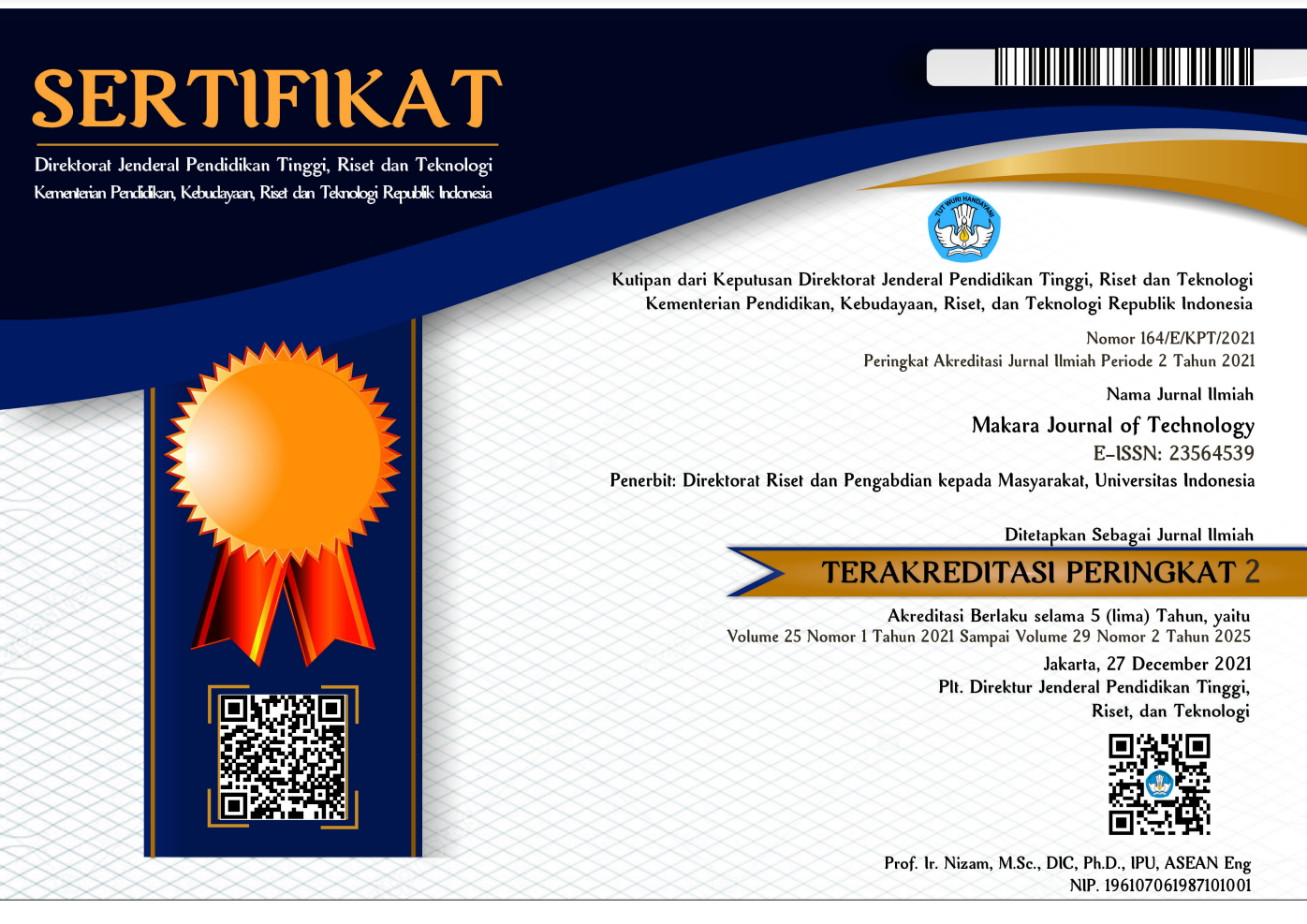Abstract
Biogasoline Production from Palm Oil Via Catalytic Hydrocracking over Gamma-Alumina Catalyst. Bio gasoline conversion from palm oil is an alternative energy resources method which can be substituted fossil fuel base energy utilization. Previous research resulted that palm oil can be converted into hydrocarbon by catalytic cracking reaction with γ-alumina catalyst. In this research, catalytic cracking reaction of palm oil by γ-alumina catalyst is done in a stirrer batch reactor with the oil/catalyst weight ratio variation of 100:1, 75:1, and 50:1; at suhue variation of 260 to 340oC and reaction time variation of 1 to 2 hour. Post cracking reaction, bio gasoline yield could be obtained after 2 steps batch distillation. Physical property test result such as density and viscosity of this cracking reaction product and commercial gasoline tended a closed similarity. According to result of the cracking product’s density, viscosity and FTIR, it can conclude that optimum yield of the palm oil catalytic cracking reaction could be occurred when oil/catalyst weight ratio 100:1 at 340 oC in 1.5 hour and base on this bio gasoline’s FTIR, GC and GC-MS identification results, its hydrocarbons content was resembled to the commercial gasoline. This palm oil catalytic cracking reaction shown 11.8% (v/v) in yield and 28.0% (v/v) in conversion concern to feed palm oil base and produced a 61.0 octane number’s bio gasoline.
Bahasa Abstract
Konversi minyak kelapa sawit menjadi fraksi bensin merupakan salah satu upaya pencarian energi alternatif sebagai pengganti suplai energi berbasis minyak bumi. Hasil penelitian terdahulu menunjukkan minyak kelapa sawit dapat direngkah menjadi hidrokarbon melalui reaksi perengkahan katalik dengan katalis asam, salah satunya adalah katalis γ- alumina. Dalam penelitian ini dilakukan reaksi minyak sawit dengan katalis γ-alumina di dalam reaktor tumpak berpengaduk yang dilakukan dengan variasi perbandingan berat minyak/katalis 100:1, 75:1 dan 50:1 pada variasi suhu reaksi antara 260 – 340 oC dalam variasi waktu reaksi 1-2 jam. Pasca reaksi perengkahan, produk bensin alternatif ini (biogasoline) diperoleh setelah perlakuan distilasi tumpak 2 tahap. Uji densitas dan viskositas produk ini menunjukkan hasil yang mendekati sifat fisika bensin komersial. Dari hasil uji densitas, viskositas, dan Fourier Transform Infra Red Spektrofotometer (FTIR) produk reaksi perengkahan dapat disimpulkan bahwa produk optimum reaksi terjadi pada perbandingan berat minyak/katalis 100:1 dalam waktu 1.5 jam dan suhu 340 oC, dan hasil uji kandungan produk dengan FTIR, Gas Chromatography (GC), dan Gas Chromatografi-Mass Spectrofotometer (GC-MS) menunjukkan adanya kemiripan dengan kandungan bensin komersial. Berdasarkan hasil uji tersebut, produksi biogasoline pada penelitian ini memiliki yield 11.8% (v/v) dan konversi 28.0% (v/v ) terhadap umpan minyak sawit dengan bilangan oktana produknya sebesar 61.0.
References
- A. T. Farouq, A. M. Noor, Zabidi and S. Bhatia (1999), Catalytic Conversion of Palm Oil to Hydrocarbons: Performance of Various Zeolite Catalysts, Industrial and Engineering Chemistry Research, Vol. 38, No. 9, pp. 3230-3237
- A. Moestika (2004), Perengkahan Biogasoline dari Minyak Kelapa Sawit Melalui Reaksi Perengkahan dengan Menggunakan Katalis Alumina, Skripsi, Program Studi Teknik Kimia – Universitas Indonesia, Depok, Indonesia
- J.G. Speight (1991), The Chemistry and Technology of Petroleum, Marcel Dekker, Inc., New York, USA
- R. O. Idem, S. P. R. Katikaneni and N.N. Bakhshi, (1997), Catalytic Conversion of Canola Oil To Fuels and Chemicals: Roles of Catalyst Acidity, Basicity, and Shape Selectivity on Product Distribution,, Journal of Fuel Processing Technology, Vol. 51, pp 101-125.
- A. T. Farouq, M.A. Rahman and S. Bhatia (2003), Liquid Hydrocarbon Fuels From Palm Oil By Catalytic Cracking Over Aluminosilicate Mesoporous Catalyst With Various Si/Al Ratios, Microporous and Mesoporous Materials,Vol. 64, No. 1-3, pp 95-108
- A. R. Hind, S. K. Bhargava and S. C. Grocott (1999), The Surface Chemistry of Bayer Process Solids, Colloids and Surfaces, pp.359-374.
- M. M. Dewayani (2005),Pembuatan Biogasoline dari Palm Oil Metil Ester Melalui Reaksi Perengkahan dengan Inisiator Metil Etil Keton Peroksida dan Katalis Asam Sulfat, Skripsi, Program Sudi Teknik Kimia – Universitas Indonesia, Depok, Indonesia
- M.V. Twigg (1989), “Selective hydrogenation of fats and oils”, Catalyst Handbook, Wolfe Publishing Ltd., London, UK
- N.N. Greenwood and A. Earnshaw (1984), Chemistry of the Elements, Pergamon Press, New York, USA.
Recommended Citation
Wijanarko, Anondho; Mawardi, Dadi Ahmad; and Nasikin, Mohammad
(2006)
"Biogasoline Production from Palm Oil Via Catalytic Hydrocracking over Gamma-Alumina Catalyst,"
Makara Journal of Technology: Vol. 10:
Iss.
2, Article 1.
DOI: 10.7454/mst.v10i2.423
Available at:
https://scholarhub.ui.ac.id/mjt/vol10/iss2/1
Included in
Chemical Engineering Commons, Civil Engineering Commons, Computer Engineering Commons, Electrical and Electronics Commons, Metallurgy Commons, Ocean Engineering Commons, Structural Engineering Commons



